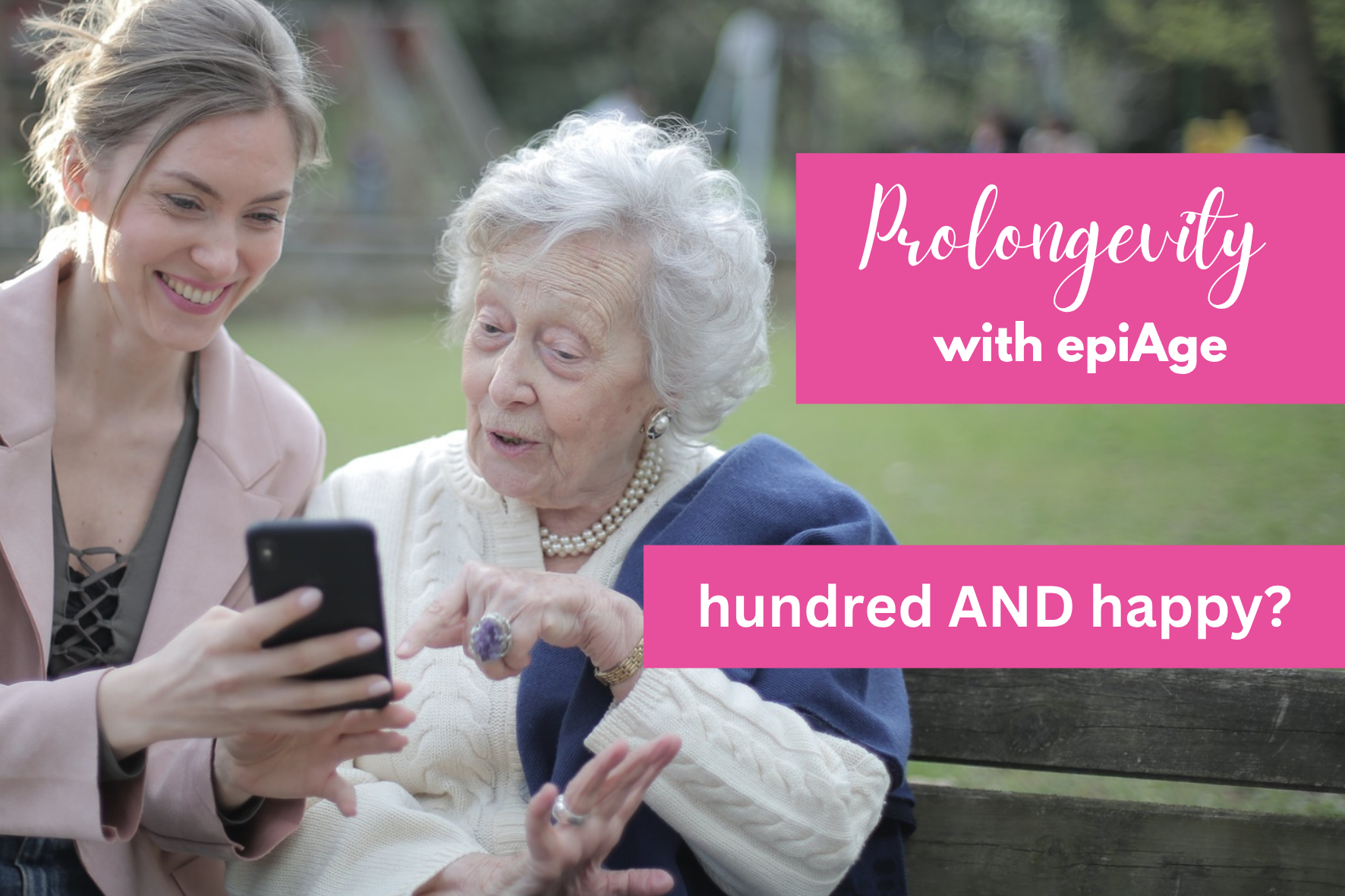Missed the last Prolongevity episode on the Mediterranean Diet? Here goes...
Ageing well?
So, you’re all set to reach your 100th birthday in great health?
You eat right, you move enough, you sleep well, and you manage your stress?
Well, that’s a good start! But as you are probably aware, physiological health is but one aspect of quality of life and true health rests on psychological wellbeing. Indeed, who hasn’t heard of reasonably healthy elderlies who can’t wait to die?
Reaching a grand old age is certainly an accomplishment. But even in the absence of major health issues, it can be marred by a number of psychosocial factors. Loneliness, absence of goals, (partially) restricted autonomy, existential fatigue, cognitive decline, (technological) overwhelm – to name but a few of them – mean that longevity may not always seem like a gift.
Hence, what is that elusive something beyond genes and current physiological health that keeps some centenarians not only going but also (reasonably) happy?
The challenges of extreme ageing investigation
Strangely enough, while you can find an avalanche of scientific articles on physiological longevity, there is a relative dearth of peer-reviewed articles on the “soft skills” of extreme ageing, compared to the abundant popular literature on mostly anecdotal “centenarian secrets”.
Why is that so? Well, there are a number of practical considerations when studying the very elderly. Despite the obvious increase in the centenarian population, the first challenge is actually recruiting a substantial and reasonably representative cohort, since centenarians must not only be found but also concretely accessed. Indeed, a majority of centenarians are in care contexts – be it in their families or institutional settings – thus often hindering direct access.
The next hurdle for a psychosocial study is to find centenarians who are actually well enough (physically, mentally and cognitively) to actively participate in interviews and assessments or have family members and carers willing to act as (partial) proxies. This constellation creates a number of unavoidable biases: most notably, the fact that centenarians struggling with ill-health will hardly be motivated or even capable of participating… This bias may in turn obscure how significantly ill health impacts otherwise good coping skills, life satisfaction and happiness. Add to these challenges variables pertaining to gender imbalance, education, economic or social status and both the design and implementation of these studies have the makings of a logistical nightmare.

Mapping the personalities of extreme agers
So, all the more kudos to researchers in the field for tackling these studies, even if, seen from the outside, cohorts may appear rather modest and not very representative.
An impressive breakthrough and landmark in this respect, was the so-called Georgia Centenarian Project (hereafter GCP) led by Leonard W. Poon, then Director (now Emeritus) of the Institute of Gerontology at the University of Georgia between 1988 and 2009 that spawned hundreds of articles and thousands of references. The cross-sectional and longitudinal project followed 3 cohorts of individuals in their 60s, 80s and 100s, mapping the evolution of the ageing process from biological, psychological and sociological perspectives to understand centenarians’ longevity.
During this project and in its wake, a number of investigations were launched to find out whether centenarians shared certain personality traits that helped foster their survival, beyond genes, lifestyles or circumstances. While also drawing on previous studies, a GCP study from 2006 found out that, based on the so-called Big-5 personality typology, centenarian personalities seemed to share low levels of Neuroticism (i.e. a certain psychological stability) as well as high levels of Competence. But the study also emphasised the cluster-like combination of these traits that were very often paired with high Extraversion (but not always…) as well as other traits.
While these findings are certainly interesting and mostly correlate with those of prior and later studies, they do not come as a huge surprise. And for individuals wishing to emulate centenarians’ longevity, personality traits may be difficult to influence since they are often shaped by personal exposure to particular relationships and circumstances rather than personal choice.
From personalities traits to psychological resources
This makes a recent study (2023) by a Spanish team investigating the psychological resources of centenarians all the more fascinating since resources, as opposed to personality traits, can be actively cultivated.
The researchers were able to enrol a small cohort of 19 elderly participants (16 women and 3 men between the ages of 100 and 107) as well as 15 proxies(usually a son or daughter) for two studies blending qualitative and quantitative methods. They conducted and analysed semi-structured in-depth interviews of the centenarians before correlating them with interviews of their proxies – in an attempt to verify the self-assessments of the elderly participants.
This construct enabled the researchers to distinguish “Nineteen central resources […] that were grouped into six global constructs, added to which were resilience and intelligence, which were not grouped into any category.” These six constructs were defined and refined as follows:
1. Vitality was perceived as zest for life as reflected in high energy levels, alertness and presence and sustained by activity and participation.
2. Taking pleasure in interaction included the cultivation of friendships, the appreciation of warm bonds as well as altruism.
3. Commitment encompassed competence, responsibility, honesty, and perseverance in all life roles (whether in the family, at work or in the community).
4. Control was related to autonomy, environmental mastery, and practicality.
5. Intellectual motivation meant cultivating an active mind through curiosity, love of learning and self-teaching (regardless of education level!).
6. And positivity was less related to optimism or sheer happiness than to the sense of being grateful for the good things in life (despite difficulties) as well as the capacity to enjoy even little things in everyday life.
Resilience, as an add-on, was a central common denominator to all participants, enabling them to not only rebound after experiencing tough challenges but even flourish. While intelligence was seen as a “transversal ability that permeates other psychological resources”, helping individuals to e.g., problem-solve or take up difficult challenges.

Train now for later!
As the researchers emphasise in their discussion of the results, a main limitation of the study is that it these particular psychological resources may be typical of this generation of centenarians, having transited through a particular social and historical landscape (i.e., Spanish Civil War, widespread illiteracy in rural regions, economic hardship, etc.).
Nevertheless, these soft skills overlap with resources mentioned in other longevity studies emanating from other cultural contexts. And with the exception of resilience and intelligence, these soft skills can all be actively trained and practised over the lifespan to persist into old age. So, why not start today – if you haven’t already? Taking up new hobbies, making friends with young and old, reading voraciously, volunteering, keeping up with new technologies, cultivating good habits, participating in communal activities, practicing gratitude and appreciation are just some of the avenues you can experiment with.
Resilience and intelligence are of course more elusive – the former being slowly accrued in the wake of existential challenges, while the latter may be difficult to increase. Nevertheless, intelligence can be maintained and perhaps even diversified through appropriate nourishment and challenges. So, it may be worth occasionally taking measured risks and stepping out of your comfort zone.
++++
Sources
Georgia Centenarian Study records, University Libraries, Special Collections Libraries, Online: https://sclfind.libs.uga.edu/sclfind/view?docId=ead/UA0139.xml;query=;brand=default
University of Georgia, School of Public Health, “Leonard W. Poon named distinguished research professor”: https://publichealth.uga.edu/leonard-w-poon-named-distinguished-research-professor/
Poon LW, Jazwinski M, Green RC, Woodard JL, Martin P, Rodgers WL, Johnson MA, Hausman D, Arnold J, Davey A, Batzer MA, Markesbery WR, Gearing M, Siegler IC, Reynolds S, Dai J. "Methodological Considerations in Studying Centenarians: Lessons Learned From the Georgia Centenarian Studies". Annu Rev Gerontol Geriatr. 2007 Jan1;27(1):231-264. Online: https://www.ncbi.nlm.nih.gov/pmc/articles/PMC3156654/
Martin P, da Rosa G, Siegler IC, Davey A, Macdonald M, Poon LW. “Georgia Centenarian Study. Personality and longevity: findings from the Georgia Centenarian Study”. Age (Dordr). 2006 Dec; 28(4):343-52. doi: 10.1007/s11357-006-9022-8. Online: https://www.ncbi.nlm.nih.gov/pmc/articles/PMC3259159/
Merino, M.D.,Sánchez-Ortega, M., Elvira-Flores, E. et al. “Centenary Personality: Are There Psychological Resources that Distinguish Centenarians?”. J Happiness Stud (2023). https://doi.org/10.1007/s10902-023-00700-z.Online: https://link.springer.com/article/10.1007/s10902-023-00700-z
Illustrations
Andrea Piacquadio / pexels & epiAge
Andrea Piacquadio / pexels
Italo Melo / pexels
 Back to all posts
Back to all posts